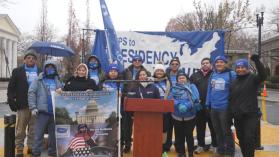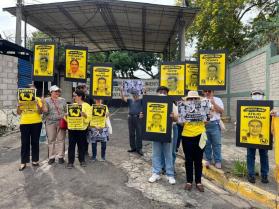ESW: Feminist Solutions for a New El Salvador: Interview with Sandra Guevara, Las Mélidas
Sandra Guevara has been with Las Mélidas, one of El Salvador’s oldest feminist organizations, since it began in 1992. Most recently, Sandra coordinated the gender working group for the National Dialogue for the El Salvador that We Want!, a massive consultation involving Salvadorans at home and abroad to develop the Farabundo Martí National Liberation Front’s (FMLN) government platform for the 2014-2019 term. Tell me a little about Las Mélidas. Las Mélidas is a feminist organization which began in 1992 after the Peace Accords were signed. It began with women who came from the core of the FPL [Popular Liberation Forces], one of the political-military forces that made up the FMLN. After having been participants in a political and armed conflict, we decided to start an organization that would fight to defend women’s rights. We didn’t know anything about gender, much less about feminism, but we began with the conviction that we wanted to contribute to the construction of a women’s movement, not an NGO. We were committed to organizing women and to empowering them so they knew their rights. Because of this, we’ve always considered women’s political participation to be extremely important. As a long-time feminist activist, what do you think has changed for women in El Salvador since Mauricio Funes became president in 2009? Generally speaking, we’ve had more legislation that favors women’s rights. Now we have close to $5 million in the national budget set aside for women’s needs, for instance. Another substantial improvement is in the Salvadoran Institute for Women’s Development [ISDEMU]. Before this term, we had an ISDEMU that merely executed projects; its primary function should have been directing public policy focused on equality. There’s also the Ciudad Mujer [Women’s City] national program. It’s truly groundbreaking. Now there’s integral health care for women offered at these centers, anything from violence prevention, to economic autonomy, to psychological services. They also have legal accompaniment services for women who might be submitting a complaint for child support, for instance. We also now have sexual and reproductive education from the Ministry of Health and that is an advancement for us. Of course overall, this government has had a much stronger social focus. I would even say a more humane focus than right-wing governments who only worked to benefit the richest families in the country. Tell me about your participation in the National Dialogue to construct the 2014 FMLN Platform. The National Dialogue began in February. It was opened up to those of us not linked to the FMLN, and I was nominated to coordinate the gender working group. We put out a wide call for women from many sectors, and formed subgroups on education, health care, youth, the economy, and for lesbian and transgender women. We created a series of proposals based on the question, “If this government were to continue, what would we propose in order to maintain the changes we’ve achieved?” We put together 10 proposals, created by about 4,000 women, and we gave it to the candidates and they agreed to take them into account. These were: - A women’s bank, so that women have easier access to credit lines - To continue with Ciudad Mujer and have it expand to all 14 states - A state budget that’s directing resources equally to women and men - A Ciudad Mujer for young women that has more specialized services, particularly in the areas of sexual and reproductive rights - That gender be included in public policy - Broader implementation of the Equality Law - Equal political participation at an electoral level - An educational curriculum with a focus on gender so we can dismantle the culture of patriarchy, of sexism, of violence - As with women, that the LGBTI community be treated equally in all areas–health care, political, economic, social After this experience, what are your thoughts on a second FMLN administration? Many women involved in the National Dialogue had participated [in politics] before, but perhaps with different hats. As Las Mélidas, we participated because we were committed to defeating the right, so that we can hopefully say, “Never again.” I think that by continuing with these changes brought about by an FMLN government, by affirming them, many women are ready to keep fighting so that others understand why it’s important to keep going as well; why it’s important to elect a second FMLN government. I’ve heard many people ask in relation to the Funes government, “Was it worth it?” And I say, “Yes it was worth it, because we’ve lived to see what many people could not have because they were murdered or disappeared.” It is for those people, for that cause that we fought for, for all the blood that was shed, that I think it was worth it. And even though we haven’t yet accomplished everything that we’ve wanted, the work of this government has been invaluable because we’ve managed to achieve all these things that we wouldn’t have had otherwise, so that we can say “Never again!” to a right-wing government.

 "I am a CISPES supporter because continuing to fight for social justice and a more people-centered country means continuing the dream and sacrifice of thousands of my fellow Salvadorans who died for that vision.” - Padre Carlos, New York City
"I am a CISPES supporter because continuing to fight for social justice and a more people-centered country means continuing the dream and sacrifice of thousands of my fellow Salvadorans who died for that vision.” - Padre Carlos, New York City

